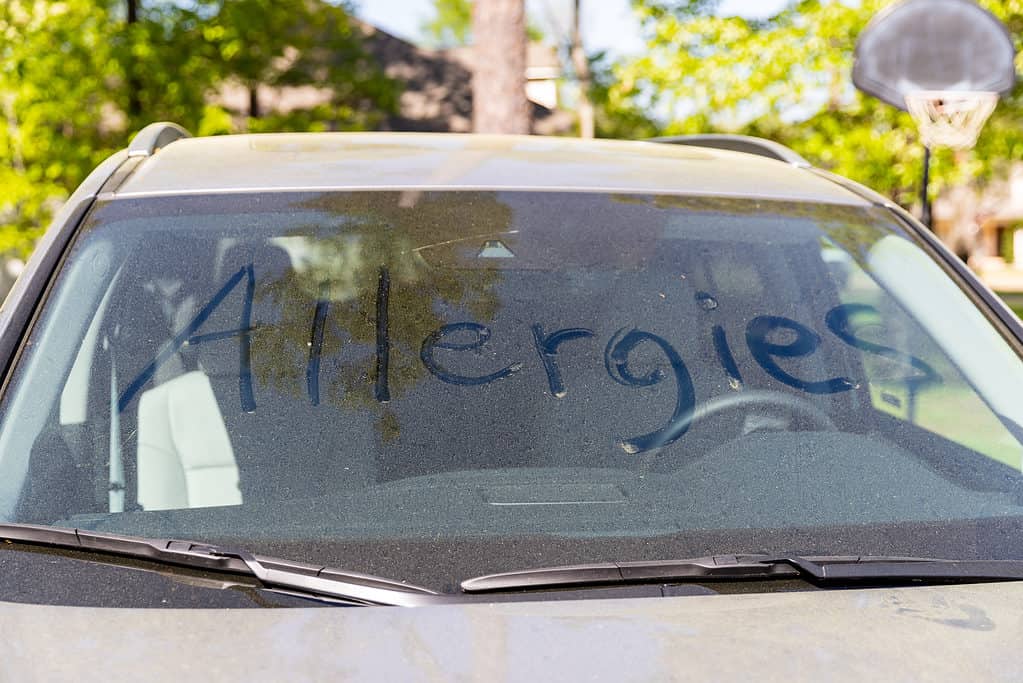Allergies can cause some people to lose their voices entirely. For example, allergens are known to irritate and enflame vocal cords, which can cause hoarseness in one’s throat. In addition to hoarseness, congestion from a stuffed nose or postnasal drip can make breathing difficult out of one’s nose and mouth. Allergy season in the United States can affect your voice, especially if you’re sensitive to pollen and other allergens.
Allergy medications may also play a role in losing your voice. Allergy medication dries up the mucus that protects vocal cords; when it dries up, your vocal cords can stiffen and inflame, which causes the voice to become raspy.
What are Allergies?

©Chad Robertson Media/Shutterstock.com
Allergies are a common chronic disease and can affect 30% of adults and 40% of children in the United States. Chronic disease is a disease that lasts a long time and occurs often. Allergies occur when the body overreacts to a seemingly harmless substance and deems it harmful. These “harmful” foreign substances are allergens. Immunoglobin is an antibody your immune system makes when you have allergies. As the antibodies respond to the allergens, the symptoms the body feels are allergic reactions. The most common allergy symptoms will make the person suffering just uncomfortable. Other than losing your voice, other allergy symptoms include watery eyes, runny nose, sneezing, rashes, and hives. Life-threatening severe allergic reactions, such as trouble breathing or swelling in your mouth and throat, could be anaphylaxis.
What is Laryngitis?

©iStock.com/seb_ra
Laryngitis is the condition when someone’s larynx or voice box becomes inflamed. This organ is in your upper neck, just past the back of your throat. The swelling of the vocal cords silences your voice, causing you to sound hoarse. When someone with Laryngitis tries to talk, all that comes out is a whisper. Laryngitis is triggered by infections like a cold or flu or environmental allergies.
What Allergies Cause Laryngitis?
Environmental allergens cause Laryngitis, like seasonal allergens such as pollen or indoor allergens like dust, dust mites, mold, and pet dander. When you inhale one of these allergens, it can trigger your body to release histamine, which then causes your body to create mucus to wash away the allergens.
How Long does Laryngitis last?
In most cases, Laryngitis gets better without treatment in about a week. However, Laryngitis symptoms can suddenly and usually worsen over two or three days.
How To Treat Laryngitis From Allergies

©Marina Demeshko/Shutterstock.com
Acute Laryngitis usually gets better within a week or so. Still, self-care measures like drinking fluids, resting your voice, and humidifying your air can cure Laryngitis faster and relieve symptoms. In addition, chronic Laryngitis treatments usually treat underlying causes of the sickness, such as excessive alcohol use, smoking, or heartburn.
Treating the core problem of allergies can help relieve someone with Laryngitis. By fixing your allergies, you can improve postnasal drip and laryngitis symptoms. Although over-the-counter medications provide temporary relief, sublingual immunotherapy is the best option for long-term allergy relief.
What are Treatments for Allergies?

©fizkes/Shutterstock.com
The severity of your symptoms and your medical history determine allergy treatment. There are three treatment strategies: avoiding allergens, medication options, and immunotherapy. Immunotherapy is an allergy therapy that trains your immune system not to overreact through allergy shots.
How to Avoid Allergies
To reduce your exposure to allergens that trigger your allergy signs and symptoms:
- Stay indoors on dry and windy days. After a good rain is the best time to go outside if you suffer from allergies because it clears pollen from the air.
- Avoid gardening chores that stir up your allergies, like lawn mowing and weed pulling.
- After you go outside, remove your clothes and shower to remove the pollen from your skin and hair.
- Wear a facemask when you go outside.
Allergy Medications
Several nonprescription medications can help relieve your allergy symptoms and help keep a healthy voice. Talk to your doctor before you begin medication in case of interactions with your prescription.
Oral Antihistamines
Antihistamines can help relieve a stuffy or runny nose, itching, sneezing, and watery eyes. Here is a popular brand we recommend:
- Dependable relief from the trustworthy Zyrtec brand.
- 24-hour formula.
- Provides relief for the symptoms of Timothy grass.
- Starts working within an hour.
Corticosteroid Nasal Sprays
If you suffer from a bad runny nose and congestion from allergies, a nasal spray may be the best medication to relieve your allergy symptoms. A good option for allergy sufferers is below:
- Non-drowsy allergy relief nasal spray
- Provides relief from runny nose, sneezing and itchy eyes
- Works for indoor and outdoor allergies
- Easy to use
- Eligible for HSA and FSA healthcare programs
How to Protect Your Voice
When experiencing allergies, avoid allergens as best you can, and keep an allergen-free home if possible. To do this, keep your windows closed and wash your sheets with hot water once a week. Keep up your water intake, as hydration helps thin mucus. You can also drink hot, clear liquids like tea and broth.
The post Can Allergies Cause a Loss of Voice? appeared first on AZ Animals.
from Animal News, Facts, Rankings, and More! - AZ Animals https://ift.tt/QWtBxom

